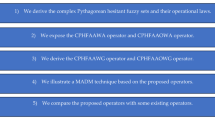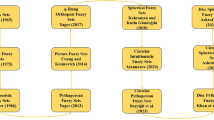Abstract
In this paper, we point out that the transfer function for computing the fuzzy preference degree of Pan et al. (Fuzzy Sets Syst 312:87–108, 2017) for the construction of upward/downward fuzzy relations is not additive consistent. Appropriate counterexample is given. Further their modified versions are presented. Meanwhile, we construct upward consistency matrices of experts which satisfy the upward additive consistency and the upward order consistency simultaneously. After that, by introducing some new fuzzy upward \(\beta \)-coverings, fuzzy upward \(\beta \)-neighborhoods and fuzzy upward complement \(\beta \)-neighborhoods are proposed and related properties are studied. Furthermore, we propose multigranulation optimistic/pessimistic \(\left( {\mathcal {I}},{\mathcal {T}}\right) \)-fuzzy upward rough set based on fuzzy upward \(\beta \)-covering and investigate some of their properties. Finally we construct a new approach to multiple attribute decision making problem based on multigranulation optimistic/pessimistic \(\left( {\mathcal {I}}, {\mathcal {T}}\right) \)-fuzzy upward rough set. The decision making procedure, methodology and the algorithm of the proposed technique are given. The detailed comparison of the present work with other methods to multiple attribute decision making problem illustrates the advantages of the this work and limitations of other studies.
Similar content being viewed by others
References
Alcantud JCR (2002) Revealed indifference and models of choice behavior. J Math Psychol 46:418–430
Aldape-Perez M, Yanez-Marquez C, Camacho-Nieto O, Arguelles-Cruz AJ (2012) An associative memory approach to medical decision support systems. Comput Methods Programs Biomed 106(3):287–307
Ali A, Ali MI, Rehman N (2018) New types of dominance based multigranulation rough sets and their applications in conflict analysis problems. J Intell Fuzzy Syst 3(35):3859–3871
Arsene O, Dumitrache I, Mihu I (2015) Expert system for medicine diagnosis using software agents. Expert Syst Appl 42(4):1825–1834
Azar AI, EI-Metwally SM (2013) Decision tree classifiers for automated medical diagnosis. Neural Comput Appl 23(7–8):2387–2403
Bonikowski Z (1995) Algebraic structures of rough sets. In: Ziarko WP (ed) Rough sets, fuzzy sets and knowledge discovery. Springer, Berlin, pp 242–247
Cheng CH, Liu WX (2018) Identifying degenerative brain disease using rough set classifier based on wavelet packet method. J Clin Med 7:124. https://doi.org/10.3390/jcm7060124
De Cock M, Cornelis C, Kerre EE (2004) Fuzzy rough sets: beyond the obvious. In: Proceedings of the 2004 IEEE international conference on fuzzy systems, pp. 103–108
Deng X, Yao Y (2014) Decision-theoretic three-way approximations of fuzzy sets. Inf Sci 279:702–715
Deng TQ, Chen YM, Xu WL, Dai QH (2007) A novel approach to fuzzy rough sets based on a fuzzy covering. Inf Sci 177:2308–2326
Du WS, Hu BQ (2016) Attribute reduction in ordered decision tables via evidence theory. Inf Sci 364:91–110
Dubois D, Prade H (1990) Rough fuzzy sets and fuzzy rough sets. Int J Gen Syst 17:191–209
Esfandiari N, Babavalian MR, Moghadam AME, Tabar VK (2014) Knowledge discovery in medicine: current issue and future trend. Expert Syst Appl 41(9):4434–4463
Greco S, Matarazzo B, Slowinski R (1999) Rough approximation of a preference relation by dominance relations. Eur J Oper Res 117:63–83
Greco S, Matarazzo B, Slowinski R (2001) Rough sets theory for multicriteria decision analysis. Eur J Oper Res 129:1–47
Greco S, Matarazzo B, Slowinski R (2002) Rough sets methodology for sorting problems in presence of multiple attributes and criteria. Eur J Oper Res 138(2):247–259
Herrera-Viedma E, Herrera F, Chiclana F, Luque M (2004) Some issues on consistency of fuzzy preference relations. Eur J Oper Res 154:98–109
Hu Q, Yu D, Guo M (2010) Fuzzy preference based rough sets. Inf Sci 180:2003–2022
Inan U, Gul S, Imaz HY (2017) A multiple attribute decision model to compare the the firms occupational health and safety management perspectives. Saf Sci 91:221–231
Ishizaka A, Nemery P (2013a) Multi-criteria decision analysis: methods and software. Wiley, Hoboken
Ishizaka A, Nemery P (2013b) A multi-criteria group decision framework for partner grouping when sharing facilties. Group Decis Negot 22(4):773–799
Kreyea M, Gohb Y, Newnesa L, Goodwinc P (2012) Approaches to displaying information to assist decisions under uncertainty. Omega 40(6):682–692
Li TJ, Ma JM (2007) Fuzzy approximation operators based on coverings. In: Proceedings of joint rough set symposium, pp. 55–62
Li TJ, Leung Y, Zhang WX (2008) Generalized fuzzy rough approximation operators based on fuzzy coverings. Int J Approx Reason 48:836–856
Lin G, Liang J, Qian Y (2013) Multi-granulation rough sets: from partition to covering. Inf Sci 241:101–118
Liu GL, Zhu W (2008) The algebraic structures of generalized rough set theory. Inf Sci 178(2):4105–4113
Ma L (2016) Two fuzzy covering rough set models and their generalizations over fuzzy lattices. Fuzzy Sets Syst 294:59–70
Mou Q, Xu Z, Liao H (2017) A graph based group decision making approach with intuitionistic fuzzy preference relations. Comput Ind Eng 110:138–150
Pan W, She K, Wei P (2017) Multi-granulation fuzzy preference relation rough set for ordinal decision system. Fuzzy Sets Syst 312:87–108
Pawlak Z (1982) Rough sets. Int J Comput Inf Sci 11:341–356
Qian Y, Liang J, Yao Y, Dang C (2010) MGRS: A multi-granulation rough set. Inf Sci 180:949–970
Qian Y, Li S, Liang J, Shi Z, Wang F (2014a) Pessimistic rough set based decisions: a multigranulation fusion strategy. Inf Sci 264:196–210
Qian Y, Zhang H, Sang Y, Liang J (2014b) Multi-granulation decision theoretic rough sets. Int J Approx Reason 55:225–237
Radzikowska A, Kerre E (2002) A comparative study of fuzzy rough sets. Fuzzy Sets Syst 126:137–155
Rehman N, Ali A, Ali MI, Park C (2018) SDMGRS: Soft dominance based multi granulation rough sets and their applications in conflict analysis problems. IEEE Access 6:31399–31416
Shah N, Rehman N, Shabir M, Ali MI (2018) Another approach to roughness of soft graphs with applications in decision making. Symmetry. https://doi.org/10.3390/sym10050145
Slowinski K, Stefanowski J (1999) Medical information systems-problems with analysis and way of solution. In: Pal SK, Skowron A (eds) Rough fuzzy hybridization: a new trend in decision-making. Springer, Singapore, pp 301–315
Sun B, Ma WM, Zhao HY (2014) Decision-theoretic rough fuzzy set model and application. Inf Sci 283:180–196
Yang B, Hu BQ (2016) A fuzzy covering based rough set model and its generalization over fuzzy lattice. Inf Sci 367–368:463–486
Yang B, Hu BQ (2017) On some types of fuzzy covering-based rough sets. Fuzzy Sets Syst 312:36–65
Yao YY (2010) Three-way decisions with probabilistic rough sets. Inf Sci 180:341–353
Yao YY, Yao B (2012) Covering based rough sets approximations. Inf Sci 200:91–107
Zhan J, Sun B, Alcantud JCR (2019) Covering based multigranulation (\({\cal{I}},{\cal{T}}\))-fuzzy rough set models and applications in multi-attribute group decision-making. Inf Sci 476:290–318
Zhang L, Zhan J (2019) Fuzzy soft \(\beta \) -covering based fuzzy rough sets and corresponding decision-making applications. Int J Mach Learn Cybern 10:1487–1502
Zhao Z (2016) On some types of covering rough sets from topological points of view. Int J Approx Reason 68:1–14
Zhu W (2007a) Generalized rough sets based on relations. Inf Sci 177:4997–5011
Zhu W (2007b) Topological approaches to covering rough sets. Inf Sci 177:1499–1508
Zhu W, Wang F (2003) Reduction and axiomization of covering generalized rough sets. Inf Sci 152:217–230
Zhu W, Wang F (2007) On three types of covering-based rough sets. IEEE Trans Knowl Data Eng 19:1131–1144
Ziarko W (1993) Variable precision rough sets model. J Comput Syst Sci 46:39–59
Author information
Authors and Affiliations
Corresponding author
Ethics declarations
Conflict of interest
The authors declare that they have no conflict of interest.
Ethical approval
This article does not contain any studies with human participants or animals performed by any of the authors.
Informed consent
Informed consent was obtained from all individual participants included in the study.
Additional information
Communicated by A. Di Nola.
Publisher's Note
Springer Nature remains neutral with regard to jurisdictional claims in published maps and institutional affiliations.
Rights and permissions
About this article
Cite this article
Rehman, N., Ali, A. Generalized multigranulation fuzzy rough sets based on upward additive consistency. Soft Comput 25, 3377–3401 (2021). https://doi.org/10.1007/s00500-020-05491-6
Published:
Issue Date:
DOI: https://doi.org/10.1007/s00500-020-05491-6




